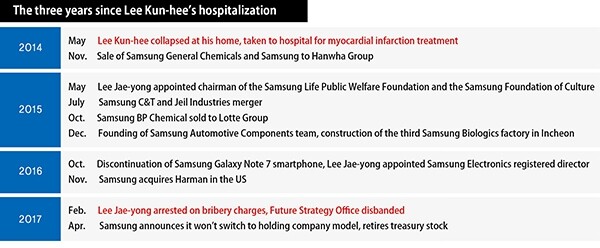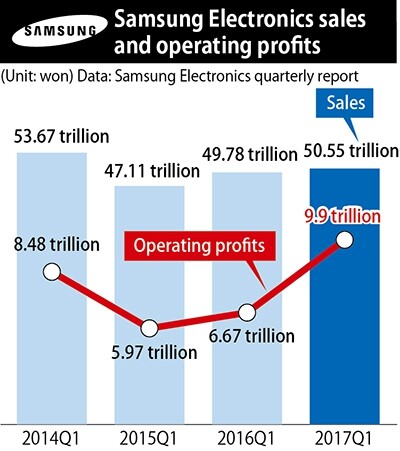hankyoreh
Links to other country sites 다른 나라 사이트 링크
Three years after Lee Kun-hee’s hospitalization, Samsung losing “Lee Kun-hee touch”

May 10 marked three years to the day since the hospitalization of Samsung Electronics chairman Lee Kun-hee. While areas outside the hospital were buzzing over the election of a new president, the VIP wing on the 20th floor of Samsung Seoul Hospital remains quiet. Former Samsung Group Future Strategy Office (FSO) head Choi Gee-sung reportedly paid frequent visits to Lee’s room in the past, but it remains unknown who is coming to visit Lee now after the FSO’s February dissolution in the wake of the Park Geun-hye/Choi Sun-sil government interference scandal.
Samsung has undergone major changes in Lee’s absence. The transfer of management rights to the third generation in the form of Samsung Electronics Vice Chairman Lee Jae-yong - a process over 20 years in the making - has been in jeopardy over the past six months. The group’s secretariat organization (the former FSO) was dismantled after decades of operation. Group-level management has ended, at least on paper, with the elimination of presidents’ meetings. In a blink of an eye, the Samsung management structure created by Lee Kun-hee has vanished.
This wasn’t the aim from the outset. When Lee suddenly fell ill in May 2014, Samsung went into action with a full-scale reorganization of its governance structure. The following June, it renamed Samsung Everland as Cheil Industries and sold off minor affiliates Samsung Techwin and Samsung Total to Hanwha and Samsung Fine Chemical to Lotte. In July 2015, it completed a merger of Samsung C&T and Cheil Industries over the objections of the hedge fund Elliott Management. The ostensible aim was to achieve “synergy” - but the real aim was to lay a firm foundation for Lee Jae-yong to defend his management authority for the Samsung Group against outside attacks. It was the final stretch of a management rights transfer process set in motion in 1995 with 6 billion won (US$5.3 million) donated to Lee Jae-yong by his father Lee Kun-hee.

But the government interference scandal threw a wrench in the attempt to adopt a holding company system centering on Lee Jae-yong. Early in the morning on Feb. 17, Lee was arrested on charges of offering bribes. The Special Prosecutor’s investigative team concluded that Lee had been involved in 43.3 billion won (US$38.3 million) worth of bribe transactions with then-President Park Geun-hye in the hopes of winning the National Pension’s approval for the Samsung C&T and Cheil Industries merger. Samsung finally moved on Apr. 27 to abandon its plan to adopt a holding company system and retire over 40 trillion won (US$35.3 billion) in treasury stock that might have been key for strengthening the governing grip of Lee, who owns just a 0.6% share of Samsung Electronics.
“The interests of the Future Strategy Office and the controlling [Lee] family were different. For the ‘vassals,’ somehow creating a sustainable management system for Lee Jae-yong was a way of allowing compensation for themselves, and they wanted to get that done within three years [during the Park Geun-hye administration],” explained a source well acquainted with the Samsung situation.
“In contrast, Lee Jae-yong felt a better way for the sake of the future would be to build a positive image, even if that took some time,” the source added.
Lee was finally arrested, and all of the team leaders - including vice chairman Choi Gee-sung of the FSO - left their positions.
“The biggest change of the last three years has been the departure of Lee Jae-yong’s retainers,” the source said.
The situation at Samsung now is one where the “Lee Kun-hee touch” is being done away with. The chief affiliate Samsung Electronics put up first quarter consolidated sales of 50.55 trillion won (US$44.7 billion) and operating profits of 9.9 trillion won (US$8.7 billion). The operating profit ratio’s rise to 19.6% comes thanks to strong performance by semiconductors and OLEDs.
“The 3D NAND [semiconductors] and OLEDs are projects Lee Kun-hee gave his full-scale support to,” said SK Securities analyst Kim Young-woo.
“Early on, they were losing money and subject to internal pressure. Lee Jae-yong’s decision to carry on with a project backed by his father ended up resulting in strong performance,” Kim said.
With Samsung focusing on the management rights transfer over the past three years, Lee Jae-yong missed his window to create products of his own. During the same time, competitors like Apple and Google were finding and actively investing in new growth drivers like artificial intelligence and self-driving cars.
“Samsung Electronics isn‘t following any principles in its management, with the scrapping of the holding company transition plan and the retirement of treasury stock,” said HI Investment & Securities analyst Lee Sang-hun.
“Whether Lee Jae-yong comes back to management or they adopt a professional manager system, they’re first going to need to establish principles that will win societal support,” Lee argued.
It could be that more positive changes for Samsung and other South Korean chaebol could come if Lee Jae-yong changes his role to that of chairman of the board rather than trying to increasing his ownership share to achieve a standing on par with his father’s.
“The results of Samsung’s failure to achieve anything over the past several months are going to start showing up in a few years,” said Seoul National University business professor Lee Kyung-mook, author of “The Samsung Way,” an examination of the Samsung Group’s listed companies.
“While Lee Jae-yong has been in jail, Samsung has been unable to exercise the kind of swift owner-manager leadership that was once its strength. At the same time, it has also failed to transition to a professional manager system without Lee, which has left it far worse off than before.”
By Lee Wan, staff reporter
Please direct questions or comments to [english@hani.co.kr]

Editorial・opinion
![[Column] Season 2 of special prosecutor probe may be coming to Korea soon [Column] Season 2 of special prosecutor probe may be coming to Korea soon](https://flexible.img.hani.co.kr/flexible/normal/500/300/imgdb/original/2024/0426/3317141030699447.jpg) [Column] Season 2 of special prosecutor probe may be coming to Korea soon
[Column] Season 2 of special prosecutor probe may be coming to Korea soon![[Column] Park Geun-hye déjà vu in Yoon Suk-yeol [Column] Park Geun-hye déjà vu in Yoon Suk-yeol](https://flexible.img.hani.co.kr/flexible/normal/500/300/imgdb/original/2024/0424/651713945113788.jpg) [Column] Park Geun-hye déjà vu in Yoon Suk-yeol
[Column] Park Geun-hye déjà vu in Yoon Suk-yeol- [Editorial] New weight of N. Korea’s nuclear threats makes dialogue all the more urgent
- [Guest essay] The real reason Korea’s new right wants to dub Rhee a founding father
- [Column] ‘Choson’: Is it time we start referring to N. Korea in its own terms?
- [Editorial] Japan’s rewriting of history with Korea has gone too far
- [Column] The president’s questionable capacity for dialogue
- [Column] Are chaebol firms just pizza pies for families to divvy up as they please?
- [Column] Has Korea, too, crossed the Rubicon on China?
- [Correspondent’s column] In Japan’s alliance with US, echoes of its past alliances with UK
Most viewed articles
- 1[Column] Season 2 of special prosecutor probe may be coming to Korea soon
- 2‘We must say no’: Seoul defense chief on Korean, USFK involvement in hypothetical Taiwan crisis
- 3Is N. Korea threatening to test nukes in response to possible new US-led sanctions body?
- 4No good, very bad game for Korea puts it out of Olympics for first time since 1988
- 5Is Japan about to snatch control of Line messenger from Korea’s Naver?
- 6Division commander ordered troops to enter raging flood waters before Marine died, survivor says
- 7Korea’s 1.3% growth in Q1 signals ‘textbook’ return to growth, says government
- 8N. Korean delegation’s trip to Iran shows how Pyongyang is leveraging ties with Moscow
- 9[Editorial] Korea’s surprise Q1 growth requires objective assessment, not blind fanfare
- 10[Editorial] Government needs to stop impeding Sewol mourning